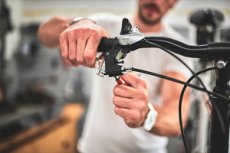Study finds exercise slows down our perception of time
Sist anmeldt: 14.06.2024

Alt iLive-innhold blir gjennomgått med medisin eller faktisk kontrollert for å sikre så mye faktuell nøyaktighet som mulig.
Vi har strenge retningslinjer for innkjøp og kun kobling til anerkjente medieområder, akademiske forskningsinstitusjoner og, når det er mulig, medisinsk peer-evaluerte studier. Merk at tallene i parenteser ([1], [2], etc.) er klikkbare koblinger til disse studiene.
Hvis du føler at noe av innholdet vårt er unøyaktig, utdatert eller ellers tvilsomt, velg det og trykk Ctrl + Enter.

Published in the magazine Brain and Behavior, the study shows for the first time that people tend to perceive time as slower when they exercise, compared to periods of rest or after completing the exercises.
Professor Andrew Edwards, Head of the School of Psychology and Life Sciences at Canterbury Christ Church University, led the work along with Dr Stein Menting and Associate Professor Marije Elferink-Gemser from the University of Groningen, and Professor Florentina Hettinga from Northumbria University. The team found that not only did time perception slow down during exercise, but that this effect was not enhanced by the presence of competitors.
Participants completed a standardized time perception task before, during, and after exercise, and cycling trials included a variety of conditions: individual rides, rides with a passive companion avatar, and competitive rides against an active rival avatar.
Professor Edwards said: "Our findings have important implications for healthy exercise choices, levels of enjoyment, and how we use this information to optimize performance."
"However, the study has several caveats," he added. "It is not yet clear whether the results can be generalized. Although the participants were not professional cyclists, they were in good physical condition, which is not the case for everyone. The sample of 33 people offers an intriguing first look at how our perception of time can be distorted - and, maybe a hint on how to take your exercises to the next level."
"The main areas of work are exploring how we can motivate people to exercise, avoid/mitigate negative associations with the slow passage of time, and perhaps see if we can use this apparent time dilation to our advantage." p>
“This research would not have been possible without the significant contributions of my colleagues and the collaboration between our universities,” said Professor Edwards.
Study participants completed a series of 4-kilometer cycling tests on a Velotron ergometer with large screens simulating race conditions with and without competitors. The team's next step will be to extrapolate these results to other groups of people and study possible effects on health and productivity.
